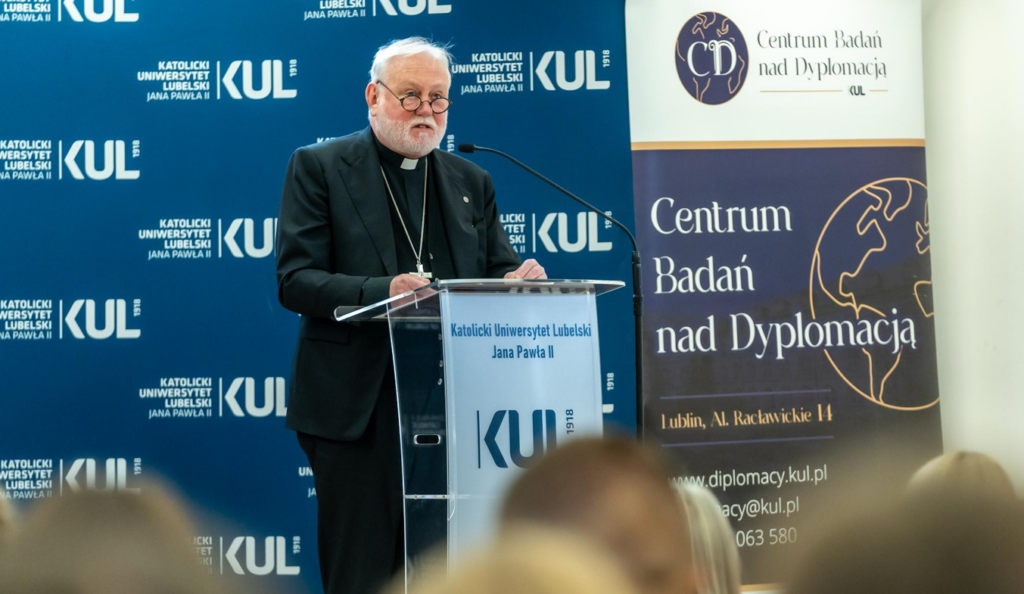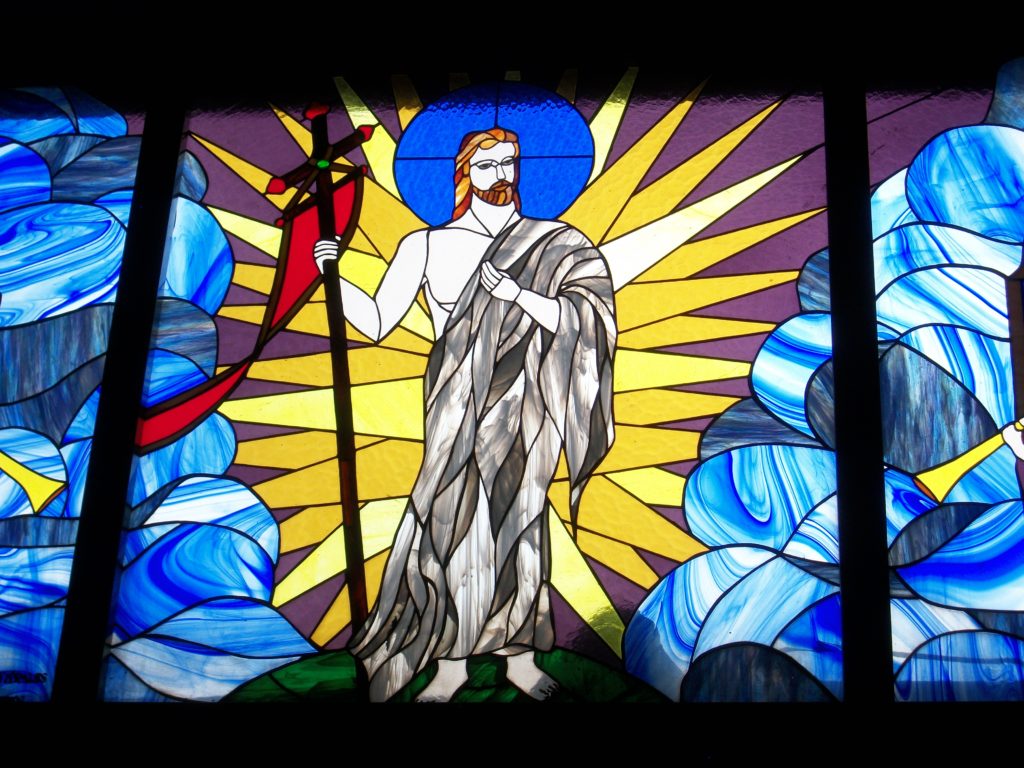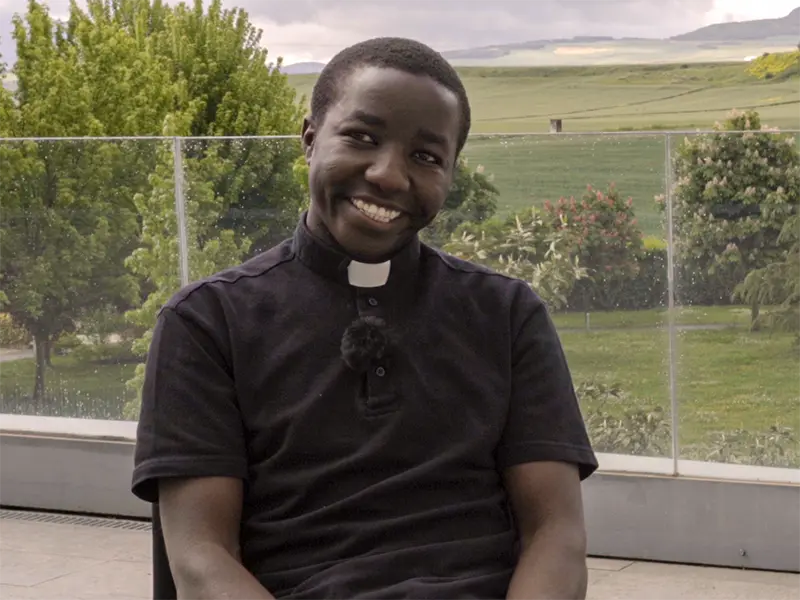Heschel Centre for Catholic-Jewish Relations at the Catholic University of Lublin
13 November, 2024
4 min
Vatican Diplomat at Lublin University: “Diplomacy of Mercy as World’s Hope”
In a lecture at the Catholic University of Lublin, Archbishop Paul Richard Gallagher, the Secretary for Relations with States in the Vatican's Secretariat of State, discussed the nature of Vatican diplomacy, its dedication to defending human dignity, promoting dialogue as a pathway to peace, and Saint John Paul II's enduring influence on this mission

Papal diplomacy in service of freedom and Church unity
Archbishop Gallagher opened by defining the mission and purpose of Vatican diplomacy, which currently maintains relations with 184 countries. He emphasized the Vatican’s longstanding tradition of stable, “Permanent Diplomacy,” a network fostering international stability. “This activity, despite all its limitations, continues today to stand in the service of peaceful human coexistence,” the Archbishop stated. He highlighted a core principle of papal diplomacy: *libertas Ecclesiae* — the freedom for Church communities to live and operate in harmony. Maintaining this bond between the “center” of the Church and its “peripheries,” he explained, is a foundation for unity, which Pope Francis describes as vital for overcoming divisions. The Archbishop stressed that this unity is the basis for all Vatican efforts to engage the world through dialogue.
Vatican’s “soft power” and the Pope as diplomacy leader
Recalling John Paul II’s example, particularly in Central Europe, Archbishop Gallagher noted that the Pope is the Vatican’s primary diplomat. “Through his exhortations and prayers, his meetings and his encyclicals, his apostolic journeys around the world, the Pope is tirelessly exercising his moral authority to remind individuals and Nations of our common responsibility to one another,” he remarked. The Vatican’s influence in international institutions often comes from its observer role rather than full membership, which strengthens its “soft power.” This neutral stance enables the Vatican to act as an effective mediator, “able to build bridges where others may only see insurmountable divides,”Gallagher explained.
Dialogue as the path to peace and the “Diplomacy of Mercy”
Archbishop Gallagher emphasized that “even in the midst of the most difficult and tenuous situations, it is dialogue that opens pathways to peace.” Interpreting current realities through the lens of the Gospel and international law, the Vatican remains committed to dialogue that fosters understanding and peace. He called this approach the “diplomacy of mercy,”a method of “building bridges, seeking dialogue with all, using humility and patience to the utmost to untie apparently inextricable knots.” This diplomacy adds a constructive value to international relations by using mercy to break cycles of hate and pride. True mercy, he argued, is a commitment to international solidarity aimed at promoting the common good.
Gallagher illustrated this “diplomacy of mercy” with the Pope’s meetings with individuals affected by what he called the “throwaway culture.” These encounters exemplify an approach that “welcomes everyone and enables all actors to give their best.”
Defending human dignity as a core mission
The Vatican’s “diplomacy of mercy” is grounded in the defense of human dignity, as seen in the Pope’s appeals for the abolition of the death penalty and his calls for prisoner pardons during the Jubilee Year. Gallagher explained that rooting diplomacy in mercy highlights its spiritual foundation, advocating for humanity’s transcendent nature and affirming its highest moral and social values. The Vatican’s unwavering commitment to human dignity, including the sanctity of life from conception to natural death, is central to its mission. The Vatican also opposes cultural “colonialism” that promotes ideologies contrary to Church teachings.
This commitment to dignity extends to access to education and culture for all, regardless of life circumstances. Gallagher praised the Catholic University of Lublin for its initiative in offering educational courses to incarcerated individuals, which is a powerful example of this inclusive approach.
In defense of the unborn
Addressing the Vatican’s stance on global health, noted that the Holy See rejects some concepts, such as “sexual and reproductive health rights,” which have morphed into an ideological agenda that promotes abortion. “The Holy See promotes the highest level of health for all human beings, including women and girls. For the same reason, it cannot remain silent in the face of nefarious attempts to undermine the health and very survival of the most innocent and vulnerable – the unborn, the elderly, the terminally ill,” he said.
The Vatican’s response to war
“In every war scenario, the Apostolic See never ceases to reiterate that the principle of humanity, engraved in the hearts of all men and all peoples, can never be compromised in the name of military needs,” the Archbishop said. This principle drives the Vatican’s advocacy for disarmament and the Pope’s condemnation of the excessive focus on armaments and nuclear strategy.
John Paul II’s example in defending religious freedom
Archbishop Gallagher praised Saint John Paul II’s focus on religious freedom as a cornerstone of his teaching and diplomatic mission. He noted that in the face of both distorted religious views leading to conflict and secularism that ignores spiritual needs, the Vatican maintains that religious freedom, respecting the autonomy and secularity of the state, is the path to peace and harmony in society.
The Vatican’s task to bring hope
“In the face of what the Holy Father calls ‘the third world war fought piecemeal,’ of phenomena such as the arms race, the nuclear threat, and terrorism, the Holy See and the structures of diplomacy are united by the same task: to be a sign of hope,” Gallagher concluded, underscoring that this mission flows from the Church’s commitment to accompany humanity across all aspects of life.
By Dorota Abdelmoula-Viet – Vatican
Related

Reflection by Bishop Enrique Díaz: Alleluia, alleluia
Enrique Díaz
20 April, 2025
5 min

Christ is Risen! Alleluia! Commentary by Fr. Jorge Miró
Jorge Miró
20 April, 2025
3 min

Easter: Mystery of Freedom
Carlos J. Gallardo
20 April, 2025
5 min

“Being Catholic in Tanzania is a source of pride”
Fundación CARF
16 April, 2025
6 min
 (EN)
(EN)
 (ES)
(ES)
 (IT)
(IT)

